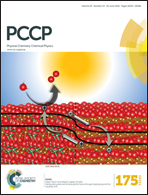Complexes of carborane acids linked by strong hydrogen bonds: acidity scales†
Abstract
Carborane acids, currently known as the strongest acis, are analyzed and compared with other species classified as superacids as well as with selected mineral acids and carbocations. Calculations (B3LYP/6-311++G(d,p) level) on these moieties as well as on their conjugate bases were performed to evaluate corresponding proton affinities. In addition, the complexes of these species with the CHB11F11− anion and the complexes of the conjugate bases with the trimethylammonium cation were analyzed. The scales, based on spectroscopic results, DFT energies and on the topological QTAIM (Quantum Theory of Atoms in Molecules) parameters, are introduced and discussed to order the acidity of the species analyzed here. The properties of the bond critical points corresponding to the intermolecular contacts are discussed. The majority of the results show that HCHB11F11 carborane acid is the strongest in agreement with the previous experimental studies of Reed and coworkers. Very often the abovementioned acidity scales show that carborane acids are able to protonate hydrocarbons.


 Please wait while we load your content...
Please wait while we load your content...